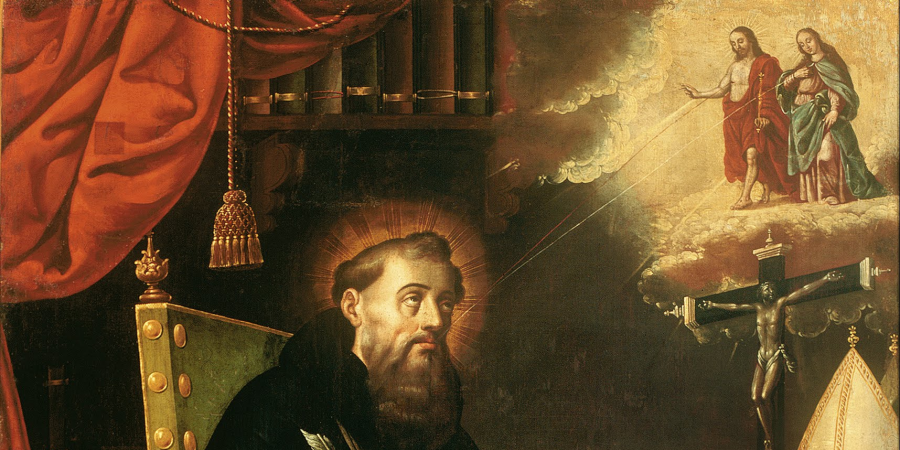

De libero arbitrio voluntatis (On Free Choice of the Will), often referred to simply as De libero arbitrio, is a seminal work by Augustine of Hippo that addresses the profound problem of evil within Christian theology. Augustine argues that free will is the root cause of all suffering and evil, thereby exonerating God from responsibility for sin. This philosophical treatise consists of three volumes, with the first completed in 388 AD, and the subsequent volumes penned between 391 and 395 AD. The work is presented as a dialogue between Augustine and his interlocutor, Evodius, exploring a range of topics, including an attempt to provide a rational proof for God's existence.
A significant aspect of De libero arbitrio is its counter to Manichaean dualism, which posited that good and evil were equally powerful opposing forces. Augustine, having been a former adherent of Manichaeism, sought to articulate a Christian perspective that upheld the monotheistic view of God’s absolute goodness and omnipotence. Thus, Augustine’s work emphasizes that evil arises not from God but from the misuse of human free will. In this light, he posits that moral accountability is inherently linked to the exercise of free will, making humans responsible for their actions.
Despite its intention to refute Manichaean thought, De libero arbitrio later became associated with Pelagianism, a doctrine that Augustine vehemently opposed, believing it misrepresented his views on grace and salvation. As a result, he softened some of the libertarian aspects of his argument in later writings. In the 13th century, Thomas Aquinas further expanded on the political implications of Augustine’s ideas, notably asserting that an unjust law lacks true legitimacy, a concept rooted in De libero arbitrio.
Before his conversion to Christianity, Augustine was a follower of Manichaeism, which framed the world as a battleground between good (God) and evil (a powerful opposing force). However, this dualistic explanation left him unfulfilled. After his baptism into the Catholic Church in 387 AD, he sought a coherent solution to the problem of evil that maintained the integrity of Christian monotheism while affirming God’s ultimate goodness and power. De libero arbitrio, initiated shortly after his baptism, was part of Augustine’s broader anti-Manichaean effort to establish a philosophical foundation for Christian belief that distinguished between divine creation and human moral failure.
The first volume of De libero arbitrio was completed while Augustine was in Rome, and the remaining volumes were written after his ordination as a priest in Africa. The work, though based on dialogues with Evodius, often shifts into extended monologues by Augustine, reflecting his evolving thought processes and foreshadowing the methodologies found in his later works.
In the first book, the dialogue commences with Evodius questioning whether God can be held responsible for evil. Augustine distinguishes between active evil (sin) and passive evil (suffering), asserting that while God permits suffering as a punishment for sin, He is not the origin of sin itself. He posits that all sin stems from disordered desires for transient goods, which ultimately detracts from the pursuit of eternal truths.
The dialogue then investigates various moral wrongs, including adultery and murder, leading to discussions about the nature of justice in human laws. Augustine argues that laws are just only if they align with the eternal law of God. He concludes that sin is the result of a will that has inverted its priorities, choosing fleeting pleasures over eternal good.
In the second book, Evodius challenges the notion of free will, questioning its necessity if it leads to sin and suffering. Augustine counters by establishing that free will is a divine gift that must be acknowledged alongside God's existence. He employs a philosophical approach reminiscent of Descartes, affirming the self’s existence as a starting point for exploring knowledge and truth. He argues that immutable truths, which transcend sensory experience, can only emanate from a divine source—thus confirming God’s existence and asserting that free will is inherently good, despite its potential for misuse.
In the final book, Evodius raises the concern that if the movement of the will away from higher goods is natural, moral responsibility becomes questionable. Augustine insists that this movement is blameworthy, affirming that free will remains intact even in light of God's foreknowledge of future events. He addresses various forms of suffering, suggesting that they serve to reinforce the goodness of creation and humanity's yearning for divine unity.
Augustine also discusses the implications of original sin and its transmission, arguing that all souls are inherently good but are tainted by the consequences of sin. The work concludes by reaffirming the triviality of temporal pleasures compared to the eternal joy of communion with God, emphasizing the moral significance of human choices.
Starting in 411 AD, Augustine engaged in a fierce theological dispute with the British monk Pelagius, who argued that humans could attain righteousness purely through free will, independent of divine grace. Pelagius quoted De libero arbitrio to support his doctrine. However, Augustine, who had shifted towards emphasizing the necessity of divine grace, argued that Pelagius misrepresented his ideas. In subsequent works, including De natura et gratia, he sought to clarify his views against the backdrop of Pelagian interpretations.
Modern scholars have debated the consistency of De libero arbitrio with Augustine’s later writings, noting its resemblance to Pelagian doctrine while also hinting at his evolving ideas on grace and moral responsibility.
Thomas Aquinas drew heavily from Augustine's political philosophy in the 13th century, citing De libero arbitrio in his discussions on law and justice, reinforcing Augustine’s assertion that unjust laws lack legitimacy, thereby shaping the discourse on moral and legal philosophy for centuries to come.
In summary, De libero arbitrio is a foundational text that not only tackles the intricate relationship between free will, sin, and divine justice but also lays the groundwork for subsequent theological and philosophical debates that resonate through the ages.
